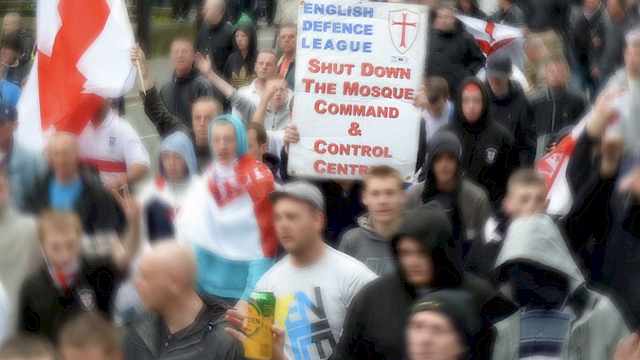Anti-minority narratives
That target minority groups threaten majority/native groups. This may include targeting specific ethnic minorities by linking them to criminality or questioning their intelligence. Far-right activism can also include amplifying mainstream news designed to cast target minority groups in a bad light.
Demographic threat
That a combination of immigration and birth rates will result in the ‘native’ population becoming a minority in the near future. This narrative is closely linked to concepts such as ‘white genocide’ as well as the ‘great replacement’. Anti-Muslim narratives also focus heavily on the demographic threat posed by Muslim immigration and birth rates as well as the perceived threat from Islamisation.
Collapse
That some type of ethnic or cultural strife is inevitable as a result of the growing threat presented by minority groups. In neo-Nazi circles, this may manifest as ‘race war’. Elsewhere this may be presented as predictions of civil war or civil disorder.
Conspiracism
Conspiracy theories are defined as the belief that a small group of actors are working towards some malevolent end. Conspiracy theorising is common in large segments of the far-right. Anti-Semitic conspiracy theories in which a Jewish elite is envisaged as controlling world events (e.g. the idea of a Zionist Occupation Government (ZOG)) are common. In other areas, theories such as Eurabia, White Genocide, the Great Replacement, and the Kalergi plan are more prevalent.
Anti-elite narratives
That the current political and social leadership bears responsibility for the current or coming crisis. For neo-Nazis, ruling elites are often presented either as Jewish or Jewish-controlled. In areas of the far-right, where anti-Semitic conspiracy theories are not endemic, this is often framed differently e.g. ‘globalist’, ‘the left’ or ‘cultural Marxist’. The far-right also exhibits a collective sense of persecution, presenting themselves as victims of societal oppression.
Historical revisionism
That key historical events have been distorted in the interests of suppressing far-right ideology. While this can be interpreted as a form of conspiracy theory, historical revisionism has been particularly prevalent in the form of Holocaust denial.
The far-right exhibits a collective sense of persecution, presenting themselves as victims of societal oppression.
Based on the above analysis, there are several clear points of conflict between different formations in the UK far-right:
Biological vs cultural distinctions
Some elements of the far-right are attempting to present themselves as shedding biological conceptualisations of race in favour of taking culture and identity as makers of belonging. This is a significant break with more traditional forms of racial nationalism.
Neo-Nazism
The symbols, rhetoric and ideology of Nazism remain toxic. While there are some openly neo-Nazi formations in the UK, open support for Nazism is a taboo in other areas of the far-right.
Ethno-pluralism vs supremacy
Where race is taken as a central organising principle, different ideological positions draw competing conclusions. While neo-Nazis and related groups argue for white-supremacy, ethnopluralists argue instead for the need to preserve difference.
Support for democracy
A key marker for distinguishing radical-right populists from the extreme right; the far-right, as a whole, varies on attitudes to democracy. This distinction needs to be treated with caution as understandings of democracy vary between groups and ideologies.
Esotericism
Recent developments among extreme neo-Nazi groupings in the US and UK have revealed inherent tensions between secular or Christian-styled neo-Nazis and those who embrace more spiritual interpretations of neo-Nazism. The influence of the fascist Satanist group the Order of the Nine Angles, for example, has caused rifts in some groups.
Read more about Ben Lee’s ‘Overview of the Far-Right’ at gov.uk
Read more
- Lee, B. (2015). A Day in the “Swamp”: Understanding Discourse in the Online Counter-Jihad Nebula. Democracy and Security, 11(3), 248–274. https://doi.org/10.1080/17419166.2015.1067612
- Meleagrou-Hitchens, A., & Brun, H. (2013) A Neo-Nationalist Network: The English Defence League and Europe’s Counter-Jihad Movement. London: ICSR.
https://icsr.info/wp-content/uploads/2013/03/ICSR-Report-A-Neo-Nationalist-Network-The-English-Defence-League-and-Europe%E2%80%99s-Counter-Jihad-Movement.pdf - Jackson, P. (2013). The License to Hate: Peder Jensen’s Fascist Rhetoric in Anders Breivik’s Manifesto 2083: A European Declaration of Independence. Democracy and Security, 9(3), 247–269. https://doi.org/10.1080/17419166.2013.802986
- Barkun, M. (2003) A culture of conspiracy: apocalyptic visions in contemporary America, Oakland: University of California Press.
- Zúquete, J. P (2018) The Identitarians: The Movement Against Globalism and Islam in Europe. Notre Dame: Notre Dame Press
- Archer, T. (2013) ‘Breivik’s Mindset: The Counterjihad and the New Transatlantic Anti-Muslim Right’. In Taylor, M. Currie, P., and Holbrook, D., (eds) Extreme Right Wing Political Violence and Terrorism, London: Bloomsbury Academic. pp169–185
- Hobbs, M (2018) “The Men Who Re-Write History”: Holocaust Denial and the British far-Right from 1967. in Copsey, N and Worley, M (eds) ‘Tomorrow Belongs to Us’: the British Far-Right Since 1967. London: Routledge. pp9-26.
- Lipstadt, D. (1993) Denying the Holocaust: The Growing Assault on Truth and Memory. London: Penguin.
- Pilkington, H. (2016) Loud and proud: Passion and politics in the English Defence League. Manchester: Manchester University Press.
- Wendling, M (2018) Alt-Right: From 4chan to the Whitehouse. London: Pluto Press.
- Mudde, C. (2007) Populist Radical Right Parties in Europe. Cambridge: Cambridge University Press.
- Hope Not Hate (2019) State of Hate 2018: People vs the Elite? https://www.hopenothate.org.uk/2019/02/17/state-hate-2019/
Copyright Information
As part of CREST’s commitment to open access research, this text is available under a Creative Commons BY-NC-SA 4.0 licence. Please refer to our Copyright page for full details.
IMAGE CREDITS: Copyright ©2024 R. Stevens / CREST (CC BY-SA 4.0)








